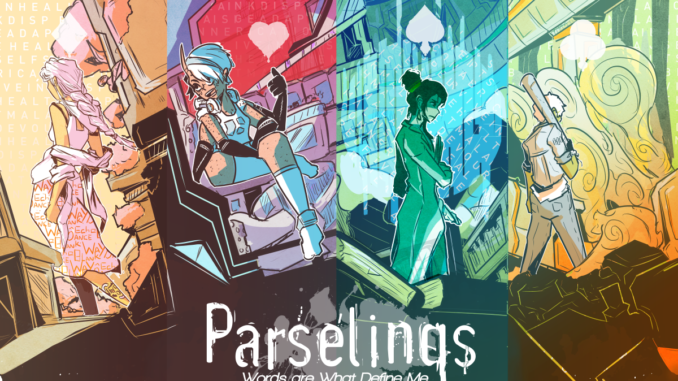
Smunchy Games has a deck-building tabletop RPG Kickstarter coming titled Parselings. Because the combination of cards and RPGs interests me, I spoke with Leo Cheung, the game designer of Parselings, and publisher, Sean Fallon (SMUNCHY), about the project, how the game will work, and more.
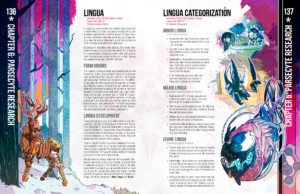 EGG EMBRY (EGG): Thanks for talking with me about your project, what is Parselings?
EGG EMBRY (EGG): Thanks for talking with me about your project, what is Parselings?
LEO CHEUNG (LEO): It’s our pleasure, Egg. Parselings is a deck-building roleplaying game about identity and collaborative word magic. The game has been in development since late 2019 and has changed a lot since its conception. At its core, it was developed around the concept of identity and our place in the society. It’s about figuring out where we fit in, the monsters we make and how our choices can redefine what we become. The players will use decks of playing cards (the regular 54 playing cards) to create/represent their characters.
EGG: What’s the setting and premise for this game?
LEO: As a larger concept, Parselings take place in a world like our own, but with a simple difference – to some creatures, words have power.
Parsecytes, swarms of ravenous ink-like parasitic organisms, have emerged into the world causing irreversible changes to society and our ecosystem. When a Parsecyte invades a human host, a peculiar thing can happen. It can form a symbiosis with the host, together with becoming an entity known as a Parseling. At a glance, a Parseling is almost physically indiscernible from most other humans, save for the labels on their skin and the ink mixed into their blood. However, when brought together in groups, these individuals can be greater than the sum of their parts. The infected hosts can use their tattoos to form phrases to sculpt the world to their desires. This power has come to be known as a Parse.
Essentially, players step into the shoes of a Parseling, a human infected by a magical parasite and branded by words that describe them. When they use these words in phrases they can create reality warping magic to do whatever they want. As you can imagine, this leaves the story direction fairly open, and it can slip into many different settings.
Currently, the book is focused about giving you the foundation to develop your own story, but shares snippets of a world we’ve already designed, Nominal City. More setting lore is to come with future books.
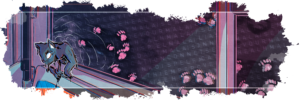 EGG: “Words are what define me”. How does that slogan describe the game?
EGG: “Words are what define me”. How does that slogan describe the game?
LEO: It’s funny, the slogan “words are what define me” was started out as a rebuttal against the old rhyme “Sticks and stones- but words will never harm me”. The phrase kind stuck with my original table, and as time went on, it began to represent something a little different. There’s actually a second part to that slogan, that we don’t always write out. It’s “What do yours say about you?” Words are for other people, they exist because there is more than just you. If we were alone, we wouldn’t really need words, you’d simply do what needed to be done. Thus, the phrase means two different things; ‘How do I/others define myself” and “Is this what I really want?”
Words have a very powerful and real presence in our day to day lives. They can be used in so many different ways and their meanings change depending on context. While we could have made it possible to use magic alone, we wanted a discussion to emerge from the table about how words could be utilized, after all it takes two to talk. Through the Parse system we try to motivate people to understand the words they use in their entirety. The good ways to use the word, the bad ways and the connotations they never really understood before.
When playing the game, players are asked to describe each of their characters to the table. The group then uses their first impressions to generate a pool of words that describe the character. From this list labels are randomly pulled to be Parseling’s tattoos. While some words may not be kind or loving it’s up to the player to decide how these words define their creation. The question is, will they use the label as a crutch, or struggle hard against it? Either way can be healthy or unhealthy for anyone.
I may have gone on a little tangent here, but essentially the slogan defines some of the core themes of Parselings as a concept, a prompt for discussion and digestion.
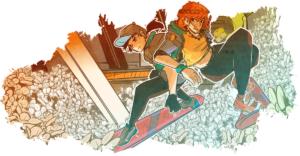 EGG: It’s a “deck-building tabletop roleplaying game”, what does that mean? Do you have a character sheet? Dice?
EGG: It’s a “deck-building tabletop roleplaying game”, what does that mean? Do you have a character sheet? Dice?
LEO: I guess the Choice system (the deck-building aspect of the game) allows you be in control of your odds. You have a character sheet with stats, but on top of that you have a deck of cards used to challenge fate. We tailored the game for people that enjoy their games to include some measure of control, rather than the whims of lady luck.
Like in all games, character sheets make up the concept of the character. They are the theoretical body or capabilities of an individual, representing their accumulated knowledge and experiences. This is a stock standard in RPGs in general, and it allows easy understanding of what a character should be like.
The deck is your character’s current state, it represents them in both body and soul. It reflects the options or mindsets they have and how they like to tackle their problems. For ease of access, we use a regular playing deck (the kind you could play poker with) to create your deck. So there’s no booster packs or specialised sets of cards involved with general Parseling character decks.
Unlike most dice based systems, it’s not the kind of game, where you can simply “borrow” another person’s deck and your odds are yours to control. We hope that even after everyone has their separate ways, you will have a physical memento to remind you of the fond time spent with friends. Perhaps even adding little notes about fun parts of their journey as quotes, or even finding a special set of card backs for your characters.
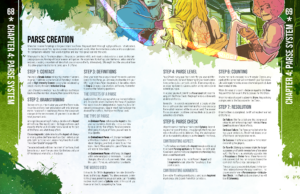 EGG: Tell me more about the system, can you give me an example of what you use the cards for specifically? Do you build your own deck?
EGG: Tell me more about the system, can you give me an example of what you use the cards for specifically? Do you build your own deck?
LEO: As mentioned before, the deck is a representation of the character’s current state of mind. When attempting an action, players draw cards from their deck based on stats on the character sheet. Each card could be considered a thought, or a way of tackling any problem.
Values
The numbers of a card represent the complexity of thought. Aces(1s) representing simple and direct solutions to a problem. 10s being high risk and high reward thought patterns. While you could simply load up your deck with high values, it might not be the best course of action. If your character is not capable of using them, they are simply treated as Value 1 cards when drawn. (Try asking child to run across the yard using parkour instead of simply walking in a straight line. Both of them might get the job done, but one is definitely more reasonable and less likely to end up with injuries.)
Suits
We also use the different suits to represent different mentalities;
- Clubs (feats) are for the hands on approach.
- Spades (Intent) is all about rationalisation or thinking.
- Hearts(conduct) is all about how you carry yourself in a social situation.
In terms of building your own deck, you’d have to consider what kind of person you are playing with. A more brute-like or physical character would have more Clubs in their deck, while an intellectual may employ more Spades in their deck. A simple and direct individual would use low numbers, while a showoff might try to use mid to high numbers.
Deck Size
The deck size also relates to the number of options your character has available to them at any given time. During play, the deck size with shrink and grow, letting you get a grasp of what kind of action would be best next. Completing actions would normally send cards to the discard, where they would be returned to the deck after you give you Parseling a chance to rest.
However, when you get hurt or take drastic actions, cards are taken out of your deck. They are only returned after you’ve had time to heal, or you’ve taken a serious injury and have a spike of adrenaline and the flight/fight response kicks in. Depending on how you’ve filled out the character sheet, you may be able to take several grievous wounds before finally succumbing to death.
Using the Cards
Taking both of these aspects into consideration, the cards present you with something that truly represents your creation and the decisions that they make. To put this into perspective, when attempting a task, your GM will ask you to draw X amount of cards based on your stats.
Depending on the nature of the task, you’ll be looking for a different suit, (Clubs//Physical, Spaces//mental, Hearts//Social, Diamonds// Supernatural) as well as a specific success threshold.
- Cards that are of the correct suit, and have values under X will add their full value as successes.
- Cards that are of the correct suit, but have values over X will add only 1 success. i.e If you drew 5 cards, and had a card valued at 6+, it would be treated as a 1.
- Cards of the wrong suit can allow the gm to read into how your character attempted the action, or even why they failed. Too many spades might mean they acted cleverly, or even over complicated the task.
This is essentially the core of the deck-building aspect of the game. The face cards do something special, but if I keep sharing mechanics then there wouldn’t be any fun surprises left in the book
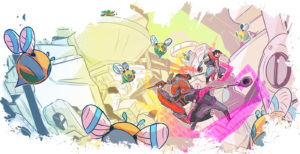 EGG: Who is working on this project (writing, editing, art, etc.)?
EGG: Who is working on this project (writing, editing, art, etc.)?
SEAN FALLON (SMUNCHY): There have been so many people a part of this project, even before Smunchy Games took the project on by publishing it.
- Art/Graphic design/layout/Mechanics – Leo
- Writing- Leo, Wendy, Wrath, Connor
- Innumerable people with proofreading/editing/contributing ideas and concepts.
- Sean Fallon (Smunchy) – now publishing, marketing, manufacturing, printing, business – etc.
EGG: For this Kickstarter, are their stretch goals? What will they add to the project?
SMUNCHY: There are stretch goals! There are currently 5 tiers of stretch goals with room to expand. These are the following stretch goals:
1. 6 Quick NPC cards with illustrated silhouettes. (These will be included in the NPC blank decks)
2. Development of extra GM rules, such as quick build Lingua and scenario building.
3. 6 more quick NPC cards with illustrated silhouettes. (These will be included in the NPC blank decks)
4. Random Encounters: GM one-shot prompt extras
5. A mystery pledge level
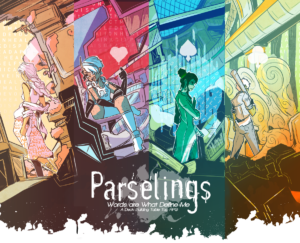 EGG: Thank you for talking to me about this project. Where can fans find out more information about your and your work?
EGG: Thank you for talking to me about this project. Where can fans find out more information about your and your work?
SMUNCHY: Thanks for having us, Egg! You can learn more about any of our games at [our website].
You can also follow us on Twitter, Instagram, Facebook, join the Smunchy Games Subreddit, [or] the Smunchy Games Discord Server. You can also find any of our world settings here on World Anvil.
Parselings from Smunchy Games
“Parselings is a deck-building Tabletop RPG.”

